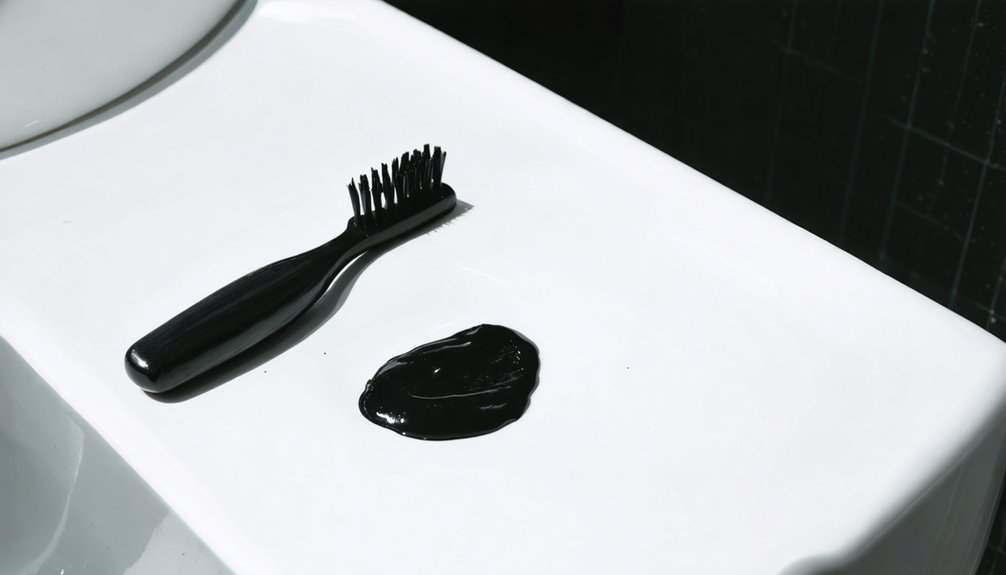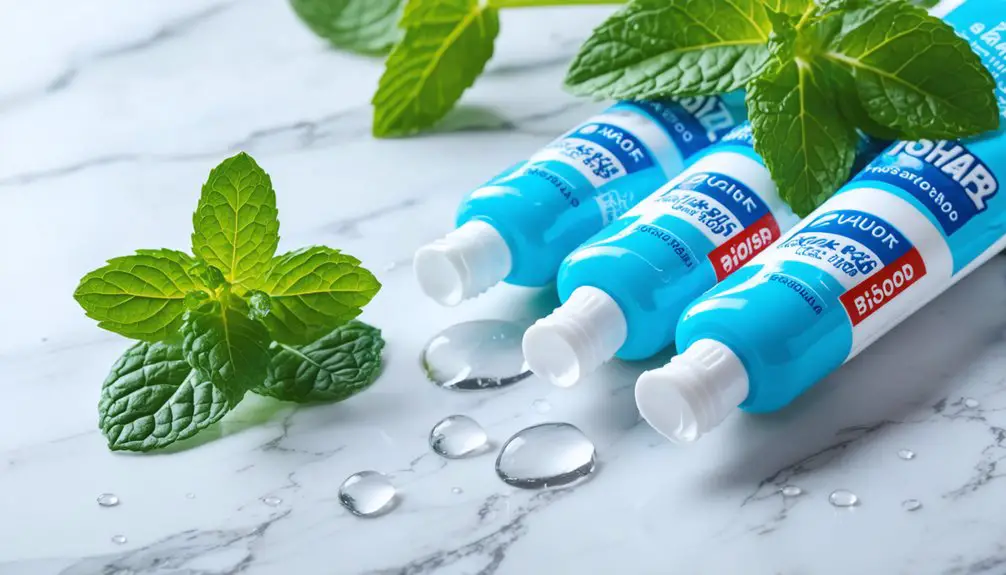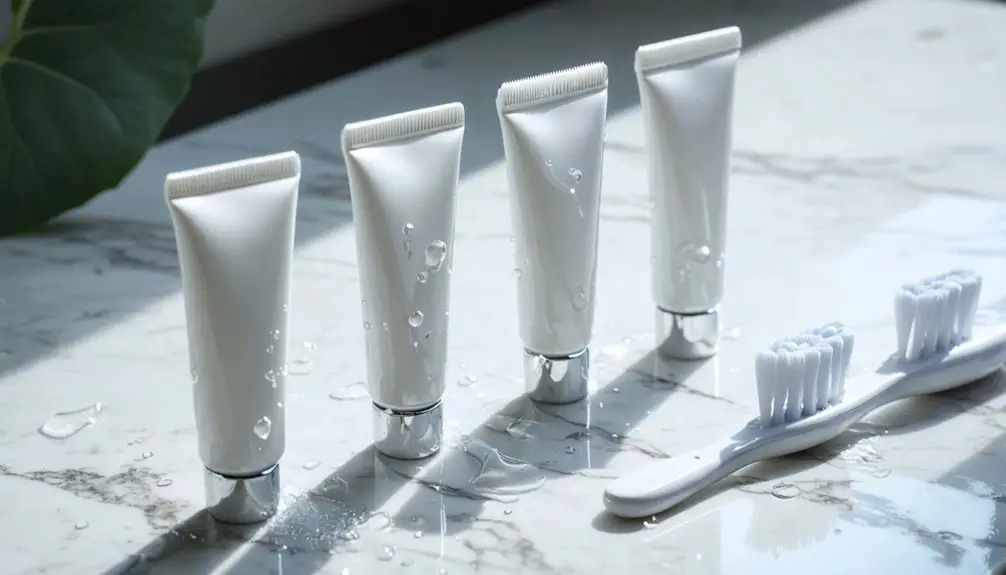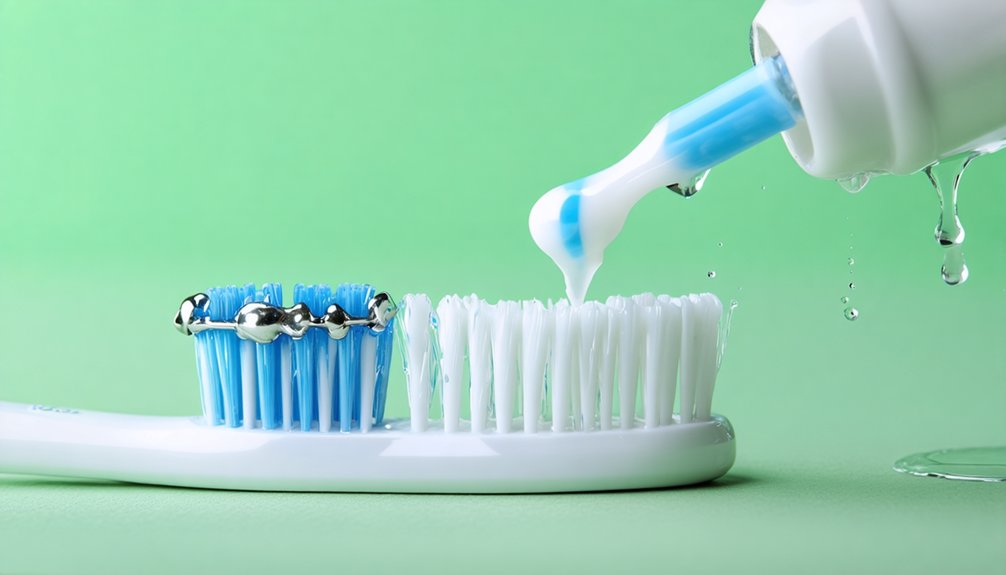Charcoal toothpaste can help brighten your smile through two main mechanisms: adsorption and abrasion. The activated charcoal binds to surface stains from coffee, tea, and tobacco while gently scrubbing away plaque buildup. While it’s effective for removing extrinsic stains, you should limit use to 2-3 times weekly to protect your enamel. For best results, consider alternating with fluoride toothpaste, as proper dental care involves understanding both benefits and risks.
Key Takeaways
- Charcoal toothpaste removes surface stains through adsorption, binding coffee, tea, and tobacco stains to its surface for effective removal.
- Its mild abrasive action helps scrub away plaque and external stains while freshening breath by absorbing odor-causing compounds.
- When used 2-3 times weekly, it can help maintain teeth brightness between professional cleanings without excessive enamel damage.
- It offers a natural alternative to chemical whiteners, though results are primarily limited to removing surface stains only.
- The gentle tartar control properties help preserve dental cleaning results, contributing to an overall brighter smile appearance.
Understanding How Charcoal Toothpaste Works
While activated charcoal has gained popularity as a tooth-whitening ingredient, its mechanism relies on two distinct processes: adsorption and abrasion.
Through the adsorption process, the highly porous charcoal particles bind stains, toxins, and bacteria to their surface, helping remove them from your teeth. Don’t confuse this with absorption – the substances stick to the charcoal rather than being absorbed into it.
The abrasive effects of charcoal particles physically scrub away surface stains and plaque during brushing. However, you’ll need to exercise caution, as excessive abrasion can damage your tooth enamel. Many dentists prefer professional treatments as safer alternatives for whitening. Due to potential risks, dental experts recommend using charcoal toothpaste only two to three times weekly.
While charcoal can help whiten teeth through abrasion, be mindful of overuse to protect your precious tooth enamel.
While manufacturers often emphasize the adsorption benefits, research suggests that charcoal’s whitening ability primarily comes from its abrasiveness, similar to other whitening toothpastes. The dark slurry that forms while brushing temporarily coats your teeth but doesn’t indicate permanent whitening.
The Science Behind Teeth Staining and Whitening
Understanding tooth discoloration requires knowledge of two distinct staining mechanisms: extrinsic and intrinsic staining.
Extrinsic stains occur when external substances like coffee, tea, wine, or tobacco deposit pigments on your tooth’s surface, attaching to the protein film called pellicle. These stains can penetrate deeper if not addressed promptly. The outer layer of teeth contains porous enamel that allows staining agents to seep through.
Intrinsic stains develop within the tooth structure itself, often due to developmental issues, medication exposure during tooth formation, or trauma causing internal bleeding. Professional evaluations show that color assessments vary among dental experts examining the same tooth.
You’ll find these more challenging to treat as they’re embedded in the dentin. Common teeth discoloration causes include poor oral hygiene, certain medications, and aging.
While staining prevention methods focus on limiting exposure to staining agents and maintaining proper oral care, it’s crucial to understand that some intrinsic factors aren’t preventable.
Key Benefits of Adding Charcoal to Your Dental Routine
Activated charcoal’s growing popularity in dental care has sparked interest in its potential benefits for oral health. As a natural ingredient, charcoal offers several cosmetic benefits while serving as a supplement to your regular dental care routine.
Key advantages you’ll experience include:
- Surface stain removal through mild abrasive action, particularly effective against coffee, tea, and tobacco discoloration. Highly absorbent charcoal particles help draw out stubborn stains from teeth surfaces.
- Fresher breath due to charcoal’s ability to absorb odor-causing compounds and reduce surface bacterial biofilms.
- Gentle tartar control through mechanical cleaning action, helping maintain results after professional dental cleanings.
While charcoal toothpaste shouldn’t replace your fluoride-containing products, you can incorporate it occasionally to enhance your smile’s brightness. The lack of fluoride in most charcoal toothpaste formulas means they don’t provide essential cavity protection.
For ideal results, use it strategically after professional cleanings to maintain surface cleanliness and aesthetic appeal.
Safety Considerations and Potential Risks
Despite charcoal toothpaste‘s potential whitening benefits, its use carries several significant safety risks that warrant careful consideration.
The highly abrasive nature of charcoal can cause irreversible enamel erosion, potentially exposing the underlying dentin and leading to increased tooth sensitivity. You’ll also find that most charcoal toothpastes lack fluoride, leaving your teeth more vulnerable to decay. The growing popularity of charcoal toothpaste stems from its appeal as a natural dental alternative. Dental professionals recommend daily fluoride toothpaste as a safer alternative for maintaining oral health.
Charcoal’s harsh texture can permanently damage tooth enamel, while its typical lack of fluoride increases cavity risk.
Additionally, you might experience unexpected staining as charcoal particles can become lodged in small cracks and between teeth.
The scientific evidence supporting charcoal toothpaste’s safety remains limited, with no products currently receiving the ADA’s Seal of Acceptance.
To protect your oral health, you should consult your dentist before incorporating charcoal toothpaste into your routine, as the risks of abrasive damage may outweigh any potential benefits.
Best Practices for Using Charcoal Toothpaste
When incorporating charcoal toothpaste into your oral care routine, proper application techniques and frequency recommendations are essential to minimize potential risks while maximizing benefits. Activated charcoal particles help absorb surface stains from tooth enamel. For best results, follow these evidence-based practices:
- Apply a pea-sized amount using gentle, sweeping motions with a dedicated soft-bristled toothbrush, and leave the paste on your teeth for approximately 3 minutes before rinsing thoroughly.
- Limit usage to 1-3 times weekly, alternating with regular fluoride toothpaste to protect your enamel’s integrity.
- Maintain proper aftercare by rinsing extensively with water, following up with fluoride toothpaste, and monitoring for any sensitivity or staining.
If you experience discomfort or have pre-existing dental conditions, consult your dental professional before starting a charcoal toothpaste regimen. The natural whitening effect comes from charcoal’s ability to bind with tannins from coffee, tea, and wine that stain teeth.
Expert Opinions and Research Findings
While clinical studies on charcoal toothpaste show mixed results for whitening efficacy, research consistently reveals concerns about its abrasive effects on tooth enamel.
You’ll find dental professionals expressing significant skepticism about long-term safety, particularly regarding enamel erosion and increased tooth sensitivity.
Based on current evidence, experts recommend choosing conventional whitening alternatives over charcoal-based products due to better documented safety profiles and more predictable results.
Clinical Studies Show Skepticism
Although activated charcoal toothpaste has gained popularity as a whitening agent, clinical studies consistently demonstrate its limited effectiveness compared to traditional peroxide-based alternatives.
Research findings have raised significant clinical skepticism about charcoal toothpaste’s limited efficacy in achieving meaningful whitening results.
Key concerns from clinical trials include:
- Whitening effects are primarily due to abrasive surface stain removal rather than true intrinsic color change.
- High abrasiveness may lead to enamel wear, increased sensitivity, and potential gum recession.
- Performance levels are comparable to regular fluoride toothpaste with no significant whitening advantage.
Spectrophotometer measurements and systematic reviews confirm that peroxide-based whitening agents deliver superior results.
Leading dental professionals discourage charcoal toothpaste use, citing insufficient scientific evidence supporting marketing claims and potential risks to dental health.
Evidence-Based Safety Concerns
Expert opinions and clinical research have identified numerous safety concerns regarding charcoal toothpaste usage. The primary concern centers on its abrasive effects, which can lead to significant enamel erosion over time.
You’ll find that charcoal particles can become lodged in microscopic tooth cracks and around dental restorations, potentially causing unsightly gray or black discoloration.
What’s particularly concerning is that most charcoal toothpastes don’t contain fluoride, leaving your teeth vulnerable to decay and demineralization.
Studies show no superior whitening benefits compared to conventional whitening toothpastes, yet they pose higher risks of gum recession and enamel damage.
When you consider the scientific evidence, the potential cosmetic benefits don’t outweigh the documented risks of long-term dental health complications.
Dental Professionals Advise Caution
Based on extensive clinical research and documented case studies, dental professionals consistently warn against the routine use of charcoal toothpaste due to its potentially damaging effects on oral health.
You’ll find that most experts recommend toothpaste alternatives containing fluoride for better oral protection.
Consider these critical findings from dental research:
- Charcoal’s abrasive particles can irreversibly damage your tooth enamel and contribute to gum recession.
- Unlike conventional fluoride benefits, charcoal toothpaste lacks essential cavity-fighting properties and may compromise your dental health.
- Professional whitening treatments offer safer, more predictable results without risking enamel erosion or staining dental restorations.
If you’re seeking whiter teeth, consult your dentist about proven treatments that won’t compromise your oral health.
Frequently Asked Questions
Can Charcoal Toothpaste Reverse Tooth Decay or Heal Cavities?
You won’t heal cavities with charcoal toothpaste, despite trendy claims about its benefits. It lacks cavity-prevention properties and fluoride needed for remineralization. Stick to proven dental treatments for decay issues.
Does Charcoal Toothpaste Work Differently on Natural Teeth Versus Dental Implants?
Yes, charcoal toothpaste works differently: it only removes surface stains on natural teeth through abrasion, while it’s ineffective on dental implants and can actually damage their surfaces or leave residue.
How Long Does Charcoal Toothpaste Take to Show Noticeable Whitening Results?
Like morning fog lifting, you’ll notice subtle brightness in 2-4 weeks, with more visible whitening appearing at 6-8 weeks. Effectiveness factors include stain type and consistency of your daily brushing routine.
Can Children or Pregnant Women Safely Use Charcoal Toothpaste Products?
You’ll want to avoid charcoal toothpaste for children due to safety concerns like swallowing risks. Pregnant women should consult doctors first and consider alternative options like baking soda or fluoride toothpaste.
Will Charcoal Toothpaste Stain Light-Colored Bathroom Fixtures or Clothing?
You’ll need to manage staining risks, as charcoal toothpaste can discolor light fixtures and clothes. Prevent issues by rinsing surfaces promptly and using gentle cleaning tips like dish soap solutions.
References
- https://www.healthline.com/health/dental-and-oral-health/charcoal-toothpaste
- https://belleviewdental.com/charcoal-toothpaste-pros-and-cons/
- https://penndentalmedicine.org/blog/does-charcoal-toothpaste-work/
- https://www.lighthousedentalcentre.com/blog/charcoal-toothpaste-the-pros-and-cons
- https://www.health.harvard.edu/staying-healthy/is-charcoal-toothpaste-safe-for-my-teeth
- https://g-p-dental.com/charcoal-toothpaste-myth-or-miracle-for-teeth/
- https://www.trailheadadvanceddentistry.com/does-charcoal-toothpaste-work/
- https://www.consumerreports.org/health/dental-oral-care/does-charcoal-toothpaste-work-a7477277301/
- https://pmc.ncbi.nlm.nih.gov/articles/PMC8095700/
- https://pmc.ncbi.nlm.nih.gov/articles/PMC8404563/



